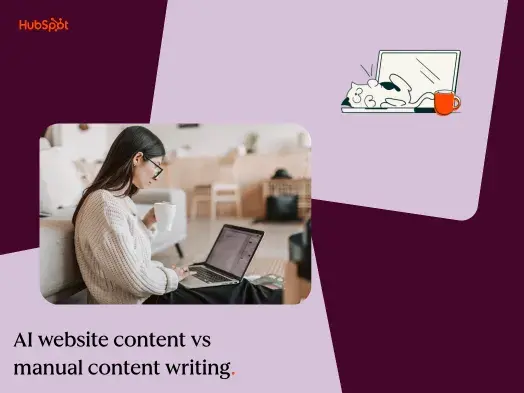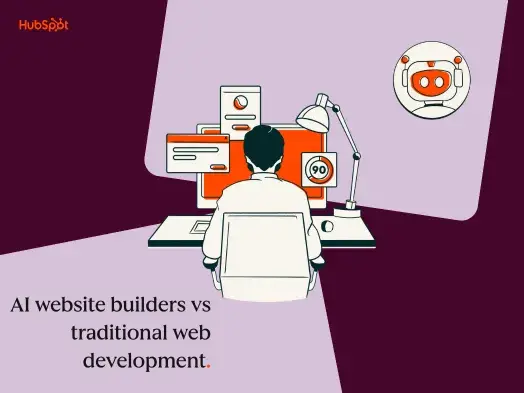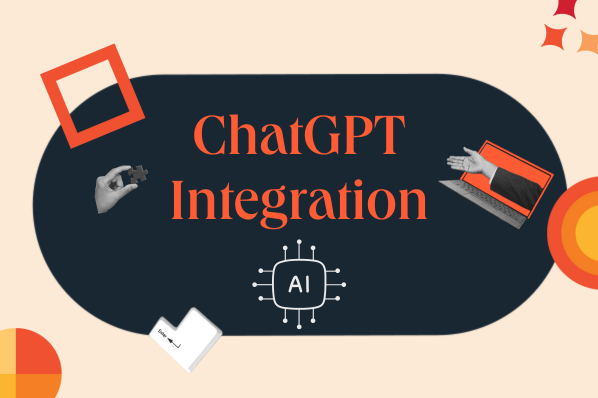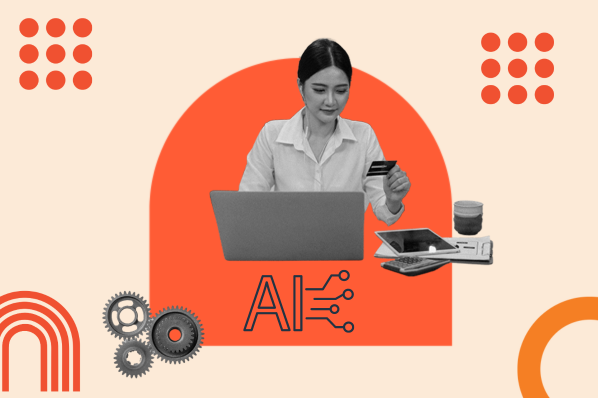This technology is no longer limited to large corporations. Businesses of all sizes now use AI to tailor website experiences, boost engagement, improve conversion rates, and strengthen customer relationships. When applied thoughtfully, AI content personalization allows marketing teams to deliver relevance at scale, turning data into meaningful, human-centered experiences.
This article explores how AI-powered content personalization works, its influence on contemporary marketing, and the practical steps organizations can take to effectively implement it on their own websites.
Table of Contents
- What is AI Content Personalization?
- How AI Personalization Tools Work
- The Personalization Process
- Types of AI-Driven Personalization
- Top AI Personalization Tools for Different Business Needs
- Choosing the Right Tool
- The Benefits of Using AI Personalization Tools
- How to Use AI for Web Content Personalization
- How to Implement AI Content Personalization on a Website
- Challenges and Future of AI Personalization
- FAQs About AI Content Personalization
What is AI Content Personalization?
Content personalization is when marketers use data to tailor digital content and messaging to users. Web pages, emails, and other digital interactions are presented to consumers based on their interests, behaviors, and preferences.
AI content personalization refers to the use of AI technologies to tailor content on a website to individual users. AI can personalize content on a much deeper and more analytical level than a marketer alone could.
According to data from HubSpot’s State of Generative AI Report, 77% of marketers believe generative AI marketing is effective at making their content more personalized. That’s really helpful, considering 96% of marketers also say that personalization increases buyer repeat purchases, and 94% believe it boosts sales.
Why Personalization Matters
Personalized content helps brands cut through the noise and connect with audiences in more meaningful ways. Instead of offering one-size-fits-all messaging, personalization allows businesses to tailor experiences based on real customer needs and behaviors, which increases relevance, trust, and results.
“Personalized content is no longer optional. It's a competitive differentiator,” says Mike Ford, CEO of Skydeo, a data company that provides high-performance audience targeting for advertisers. “Personalization transforms the customer experience from generic to unforgettable. When users feel like a brand understands them and their needs, they’re more likely to engage, purchase, and be loyal.”
He adds that brands like Netflix, Amazon, and Spotify have set a high bar by delivering tailored experiences that feel seamless and essential.
How AI Personalization Tools Work
AI personalization tools take raw customer data (like clicks, searches, purchases, and browsing behavior) and turn it into meaningful, individualized experiences. They achieve this through a combination of machine learning, language understanding, and predictive modeling, all of which operate quietly in the background while visitors browse, shop, or read. The result is a website that feels like it was built just for them.
At their core, these tools learn by observing patterns. Each time a visitor interacts with a brand, the AI takes note: what pages were viewed, how long they stayed, what products they added to their cart, and what content they ignored. Over time, the system connects those dots to understand what drives engagement and what doesn’t, and then uses that knowledge to adapt content, offers, and recommendations in real time.
Here’s a closer look at the key technologies that make this possible:
Machine Learning Algorithms
These models sit at the heart of every AI personalization engine. They learn from historical and live data to identify trends, for instance, noticing that users who buy a certain skincare product often return for refills after six weeks. The system uses these insights to automatically serve reminders, offer discounts, or highlight complementary products.
Natural Language Processing (NLP)
NLP helps AI understand the meaning behind words, not just the keywords themselves. It enables systems to interpret what visitors type into search bars, say to chatbots, or even imply through the topics they read most.
For example, if someone searches “eco-friendly shoes,” NLP doesn’t just match the words — it understands the intent: sustainability, comfort, and lifestyle alignment. That understanding allows AI to deliver results or recommendations that feel relevant, rather than generic.
Predictive Analytics Engines
This is where AI gets proactive. Predictive models look ahead, using patterns from past data to anticipate what a customer might want next. An e-commerce store might predict when someone is due for a restock, or a B2B company might identify when a prospect is likely to convert.
Real-Time Decision Engines
Many AI personalization platforms also include real-time engines that combine all these technologies. They pull data from multiple sources and decide, in milliseconds, which message to show next. That’s what enables dynamic homepage banners, changing recommendations, and personalized email suggestions that feel perfectly timed.
The Personalization Process
AI personalization works like a feedback loop. It listens, responds, and improves all in real-time. Every interaction tells the system something new about the visitor, and over time, those small signals create big shifts in how content is delivered.
Here's how the cycle works:
1. Data Collection and Integration
The process starts with gathering data from different touchpoints. AI content personalization tools pull in:
- Website activity (pages viewed, clicks, time on page)
- Purchase behavior and abandoned carts
- Email opens, clicks, and responses
- Customer service chats and support history
- Social media engagement
All of this data is synced into a central system. This creates a full view of each customer — not just what they do on the website, but how they engage across the business.
2. Real-Time Analysis
As visitors browse, the AI analyzes their behavior in real-time. It compares current actions to past patterns and instantly sorts users into segments.
Is this person likely to convert? Are they showing signs of interest in a certain product line? Are they abandoning their carts?
The system calculates these signals in milliseconds and identifies the best opportunities to personalize the experience on the spot.
3. Dynamic Content Delivery
Once the analysis is done, the AI gets to work adjusting what the visitor sees:
- Homepage layouts shift to show relevant content or products
- Email content and timing adapt based on past engagement
- Search results, recommendations, and promotions update in real time
It all happens automatically. The goal is to create a smoother, more relevant experience tailored to what the visitor likely cares about.
4. Continuous Learning
Every click, skip, scroll, and conversion feeds back into the system. Over time, the AI uses this feedback to refine what it knows about each customer to improve future predictions.
The system runs silent experiments in the background, testing different variations of content and offers to determine which ones perform best. When it identifies a winning version, it adjusts automatically. It also updates customer profiles to reflect new behaviors or preferences, ensuring that the next interaction feels even more personalized.
Types of AI-Driven Personalization
Here are some common types of AI-driven content personalization:
Personalized Recommendations
Offering personalized recommendations or tailored content suggestions is the most common way to implement AI content personalization on a website. Whether it’s an ecommerce site or a blog, presenting customers with content or products based on past behaviors is an effective way to tailor the user experience. Not only does it keep users engaged, but it also increases the chances of conversion.
Consider how Amazon curates its homepage for returning visitors. The first things shown are products and categories the algorithm predicts will be relevant based on previous shopping history. This is AI content personalization at work.
Another strong example of personalization is quizzes, particularly on beauty company websites. The shade finder quiz on makeup brand Laura Geller’s website, for instance, is designed to help users determine which of the brand’s foundation shades is the best match for their skin.

After answering a few questions, the AI-powered quiz presents a “perfect shade match” of its foundation. In addition to sharing the shade that’s the best fit, the quiz also makes product recommendations related to the foundation.
For marketers, this is a great opportunity to convert website visitors and upsell products.

Dynamic Pricing
Another way to personalize content to users is through AI pricing or dynamic pricing. AI can be used to analyze the market, user data, and competitors to offer adjusted pricing as a result.
Uber is a great example of AI-powered pricing. The ride-sharing app uses surge pricing to automatically adjust its rates based on different variables, such as high demand. This wouldn’t be possible at scale without AI technology. Machine learning can take mass data and automatically optimize pricing to meet real-time demand.

Adaptive Customer Experience
An adaptive customer experience adjusts in real time based on what a visitor has done previously, whether that’s picking up where they left off while shopping, continuing an article they were reading, or resuming progress in an app. This kind of personalization makes the journey feel seamless and intuitive. It also helps users feel recognized without needing to start over each time they return.
Duolingo is a great example of how to effectively use AI to personalize a customer’s journey on a website. Not only does the language learning app track progress as users go, but it also analyzes pace, mistakes, and goals to create a tailored learning experience.

A similar experience can be achieved on a website by prompting users to answer a few questions about themselves and their goals when they sign up. Those responses provide the initial data, and from there, AI can add to that data based on the user’s behaviors and interactions.
Top AI Personalization Tools for Different Business Needs
There are many AI content personalization tools out there, but here are seven of the best ones, including those for general content personalization, e-commerce companies, and small businesses.
1. Best Overall: HubSpot’s Content Hub

HubSpot Content Hub is an AI-powered content marketing platform designed to manage the entire content lifecycle, from creation to optimization. Originally known as CMS Hub, it has evolved into a comprehensive solution that supports blogs, landing pages, websites, social media content, and even podcasts.
What sets it apart is how it connects seamlessly with HubSpot’s CRM, turning customer data into actionable insights for personalization. This integration allows marketing teams to deliver relevant, dynamic content to different audiences without switching between tools or platforms.
Key features:
- Content Remix: Automatically repurposes a single piece of content, like a blog post, into multiple formats (social posts, emails, or landing page snippets) to extend reach and save time.
- Smart Content: Dynamically changes page elements and messaging based on visitor data such as lifecycle stage, location, or past engagement.
- Native CRM integration: Connects directly with HubSpot CRM to inform personalization and performance tracking, ensuring every piece of content is data-driven.
- Brand Voice: Trains the AI to generate content in the organization’s tone to maintain consistency across automated and manually written assets.
- Personalization tokens: Inserts individual details (such as name or company) into emails, pages, and campaigns automatically for a more tailored experience.
- SEO and analytics tools: Uses AI to provide search engine optimization tips, analyze performance, and help teams refine their strategy continuously.
Pricing:
There are two pricing tiers:
- Starter - $15/month (for each seat)
- Professional - $500/month (3 seats included)
Best for Ecommerce Businesses
For online retailers, personalization plays a critical role in driving sales and customer loyalty. Here are two AI-driven product recommendation engines designed to help e-commerce business owners attract and convert more buyers.
2. Shopify Magic

Shopify Magic is a suite of AI-powered features built directly into the Shopify platform, designed to help merchants automate content creation, personalize shopping experiences, and optimize communication with customers.
Rather than existing as a standalone app, Shopify Magic functions across multiple Shopify tools, giving merchants of any size access to intelligent automation and data-driven insights. It enables contextual personalization, helping stores recommend products, tailor messages, and engage customers more effectively.
Key features:
- Personalized product recommendations: Uses customer behavior and purchase history to generate relevant product suggestions, which increases conversions and repeat sales.
- Real-time adaptation: Dynamically updates product displays and collections based on a shopper’s current browsing session or seasonal trends.
- Smart subject lines: Automatically generates engaging subject lines for email campaigns, which improves open rates and engagement.
- Targeted messaging: Allows merchants to tailor marketing messages to specific audience segments based on purchase patterns and preferences.
- Optimized timing: Suggests the best time to send emails and notifications, maximizing visibility and response.
- Customer segmentation: Analyzes store data to identify valuable customer groups such as frequent buyers, new visitors, or inactive users for targeted outreach.
Best for: Ecommerce businesses (which use Shopify) that want to enhance personalization, automate marketing, and scale engagement without relying on external plugins or complex integrations.
Pricing: Shopify Magic itself is a free suite of AI tools, but to use it, the business must have a paid Shopify plan, which starts at $19/month (billed yearly)
3. Dynamic Yield

Dynamic Yield is an AI-powered personalization and experience optimization platform owned by Mastercard. It operates as a standalone system that integrates with a company’s existing digital infrastructure, including websites, mobile apps, email platforms, and call centers.
Its central technology, the Experience OS, uses machine learning and predictive algorithms to analyze behavioral, contextual, and offline data, so it can create cohesive, personalized customer experiences across multiple touchpoints. This ensures that every digital interaction — whether on a website or through a marketing campaign — feels relevant and timely.
Key features:
- Real-time behavioral targeting: Builds detailed customer profiles by tracking browsing activity, purchase behavior, and location, so content and offers can update dynamically based on current intent.
- AI-powered product recommendations: Uses deep learning to predict individual customer interests and serve tailored product suggestions across channels, which increases relevance and average order value.
- Affinity-based email personalization: Creates dynamic email content that adapts in real time to a recipient’s changing preferences, ensuring messaging stays relevant even after delivery.
- Experience search: Enhances on-site search with AI that understands intent, context, and user affinities. It delivers smarter, more personalized search results and supports visual or multimodal inputs.
- Automated testing and optimization: Integrates A/B and multivariate testing within campaigns and automatically deploys the best-performing variations for each audience segment.
Best for: Large and mid-sized enterprises that need advanced, cross-channel personalization capabilities integrated with complex digital ecosystems.
Pricing: Dynamic Yield doesn’t publicly disclose its pricing and instead offers custom quotes based on a client’s specific needs. To get a quote, speak to the sales team.
Best for Content Personalization
When the goal is to deliver tailored digital experiences across multiple channels, the right AI tools should understand audience behavior and adapt in real time. Here are two platforms that excel in this.
4. Optimizely

Optimizely is a Digital Experience Platform (DXP) designed to help businesses create and optimize personalized digital experiences across every channel. With AI at its core, Optimizely helps teams understand audience behavior, deliver relevant content, and improve engagement through continuous testing and optimization.
Whether adjusting a website layout, suggesting relevant products, or personalizing search results, Optimizely ensures every interaction reflects the user’s intent. Its flexible design allows organizations of different sizes and industries to scale personalization efficiently.
Key features:
- Optimizely Data Platform (ODP): Acts as a central data hub that unifies customer information from multiple sources, including websites, email, CRM, and more. This enables detailed audience segmentation based on demographics, behavior, and preferences for targeted campaigns.
- AI-powered product and content recommendations: Uses machine learning to analyze user behavior and affinities, generating personalized suggestions for products, articles, or media content in real-time.
- Intelligent web experimentation and optimization: Enhances traditional A/B testing with AI-driven “multi-armed bandit” algorithms that automatically route more traffic to the best-performing page variations.
- Optimizely AI “Opal”: An embedded AI assistant that helps create campaign assets, generate first drafts, recommend audiences, and provide guidance to streamline content personalization workflows.
- Personalized search and navigation: Adjusts search results, page layouts, and navigation structures based on user interactions, ensuring that each visitor sees the most relevant products or content.
- Content intelligence: Uses NLP to evaluate the performance of existing content and recommend improvements, so that all published material aligns with audience interests and SEO best practices.
Best for: Mid-sized to enterprise-level organizations seeking a unified platform that connects content, experimentation, and personalization under one data-driven system.
Pricing: Optimizely doesn’t publicly disclose its pricing and instead offers custom quotes based on the user's specific needs. Here’s the pricing page.
5. Adobe Target

Adobe Target is an AI-driven personalization platform within the Adobe Experience Cloud that helps businesses deliver tailored experiences across digital touchpoints like websites, mobile apps, and social media. It’s powered by Adobe Sensei, an AI framework that continuously analyzes customer behavior and automatically serves the most relevant content or offer for each visitor.
Designed for large-scale use, the platform enables teams to test, refine, and automate customer interactions using real-time data and machine learning.
Key features:
- Automated personalization (AP): Uses Adobe Sensei to dynamically combine content and offers from a single campaign, continuously testing and delivering individualized experiences based on real-time user behavior.
- Auto-target: Employs machine learning to identify and serve the highest-performing experiences for each visitor, which both eliminates the need for manual rule setting and ensures content relevance for different audience segments.
- AI-powered recommendations: Suggests products, content, or services based on previous customer actions and affinities. Algorithms such as “people who viewed this also viewed” and “recommended for you” help guide users toward items or information they’re likely to value.
- AI-powered experimentation (auto-allocate): Uses multi-armed bandit algorithms to automatically direct more traffic to the best-performing content variations during testing, which enables faster optimization and better user experiences.
- Real-time behavioral targeting: Leverages data from Adobe Analytics and the Adobe Experience Platform to adapt content instantly based on user activity, maintaining consistent personalization across web, app, and email channels.
Best for: Large organizations and enterprises seeking a deeply integrated AI personalization platform that combines automated optimization with extensive testing and analytics capabilities.
Pricing: Adobe Target doesn’t publicly disclose its pricing and instead offers custom quotes tailored to each organization's specific needs. Here’s the pricing page.
Best for Small Businesses
For smaller teams, the ideal AI personalization tool should be one that simplifies workflows without requiring deep technical expertise. Here are two tools that offer exactly that balance.
6. Jasper AI

Jasper AI is an AI co-pilot built specifically to help marketing and sales teams create, personalize, and scale content efficiently without sacrificing quality or brand consistency. It combines the power of advanced language models with proprietary AI layers that add marketing context, which helps businesses generate tailored, high-performing content across every customer touchpoint.
Jasper learns a company’s tone, voice, and positioning, then applies that knowledge across different formats, from blog posts and ads to emails and landing pages. This results in a streamlined content process where every message feels relevant to its audience and aligned with the brand’s identity.
Key features:
- Audience knowledge: Allows marketing teams to define and manage specific audience segments within the platform, including their preferences, tone, and messaging. This ensures every campaign speaks authentically to each target group.
- Brand voice customization: Lets users teach Jasper their brand’s tone, style, and language, so it can automatically apply that voice to all generated content, ensuring consistency across all customer-facing materials.
- Knowledge assets: Helps Jasper securely access a company’s proprietary data, including product information, audience insights, and strategy documents, so all generated content remains accurate, brand-specific, and contextually rich.
- Jasper API: Provides enterprise-level integration options that allow businesses to programmatically generate large volumes of personalized content (like product descriptions, emails, or ad variations) based on real customer data.
- Personalization agent: Uses customer insights and behavioral data to generate hyper-personalized content for channels like email, social ads, and website copy.
- Campaign acceleration: Eases the creation of multi-channel campaigns by automatically adapting core messaging to different platforms while preserving tone and intent.
Best for: Small to mid-sized marketing teams looking for an AI content platform that combines personalization, brand control, and scale without the complexity of enterprise systems.
Pricing: Jasper AI offers a 7-day free trial. Its pricing plans start at $59/month (per seat), and there’s a custom Business plan available.
7. Zoho PageSense

Zoho PageSense is a conversion rate optimization (CRO) and website personalization platform designed to help businesses understand visitor behavior and deliver targeted web experiences that drive conversions.
While PageSense incorporates AI and machine learning for select personalization tasks, it primarily focuses on a user-friendly, rules-based approach that gives marketers control over how different audiences see their content. Its visual editor and data-driven reports allow teams of all sizes to test, customize, and optimize experiences without relying heavily on technical support.
As part of the Zoho suite of business applications, PageSense integrates seamlessly with other Zoho tools, making it easy for teams to connect marketing, sales, and customer data in one place.
Key features:
- Audience segmentation: Allows marketers to group visitors into specific audiences using criteria such as demographics, browsing behavior, or context, so it can deliver tailored offers, content, and calls-to-action based on factors like location, device type, or referral source.
- Dynamic content delivery: Provides a visual editor that enables teams to display different versions of website content (headlines, images, or promotional banners) for different audience segments without coding.
- Personalization reporting: Provides detailed analytics on how each personalized experience performs, including metrics on engagement, conversion rates, and revenue. This helps marketers refine their strategies and identify which content resonates most with specific audiences.
- Integration with Zoho ecosystem: Connects seamlessly with Zoho CRM, Marketing Automation, and Campaigns to create more advanced personalization, e.g., data from a customer’s purchase history can inform which offers or recommendations appear on the website.
- Targeted engagement tools: Includes customizable on-site elements such as polls, pop-ups, and web push notifications that can be triggered based on visitor behavior or engagement level.
Best for: Small and mid-sized businesses that want an accessible, all-in-one solution for website personalization and optimization without needing extensive development resources.
Pricing:
Zoho PageSense has three pricing tiers (billed annually):
- Analyze - $12/month - $420/month (for 10k - 1 million monthly visitors)
- Engage - $18/month - $510/month (for 10k - 1 million monthly visitors)
- Optimize - $30/month - $780/month (for 10k - 1 million monthly visitors)
Choosing the Right Tool
There’s no one-size-fits-all when it comes to AI personalization tools. The best fit depends on how a business is structured, what it aims to achieve, and how quickly it needs to operate. Here are a few key things to consider before making a choice:
The Tech Stack
Look for tools that play nicely with what’s already in place. A tool that connects easily with existing data sources, like CRMs, email platforms, CMS tools, or analytics systems, will be quicker to launch and more effective from day one.
Personalization Goals
The right tool depends on what kind of personalization is most important:
- For product recommendations, ecommerce-specific platforms like Dynamic Yield or Shopify Magic make sense.
- If the focus is content personalization across blogs, websites, or landing pages, tools like HubSpot Content Hub or Optimizely are better suited.
- For email campaigns and smart segmentation, marketing automation platforms with AI features can do the job
Budget and Resources
Enterprise tools offer depth and flexibility, but they often come with higher costs and a need for technical support. Smaller businesses benefit more from lighter tools like Jasper AI or Zoho PageSense, which are easier to manage, faster to implement, and still powerful enough to make an impact.
Scalability Needs
It’s also worth thinking long-term. Will this tool still work as traffic grows or campaigns become more complex? A good personalization platform should be able to grow with the business and support more segments, more channels, and more personalized moments without starting from scratch.
The Benefits of Using AI Personalization Tools
Marketers have long used customer data and touchpoints to tailor website design and user experience, but AI allows this to be taken to the next level.
“The biggest benefit of using AI to personalize website and marketing content is that AI enables hyper-personalization at scale,” says Ford.
AI tools can deliver real-time insights and adapt to user behavior dynamically, which not only helps marketers provide a highly personal experience to customers but also saves time and resources.
The industries that benefit most from personalized content?
“Industries that thrive on data-rich user interactions are ideal for leveraging AI to drive personalized experiences,” suggests Ford. This includes ecommerce, travel, and entertainment platforms, to name a few.
No matter the industry, here are more benefits of AI content personalization:
- Higher engagement. Using AI, brands can make personalized recommendations to keep users on their websites longer. This can lead to higher engagement and lower churn.
- Increased conversions. When customers are presented with recommendations tailored to them, they’re more likely to convert. As Ford puts it: “Personalization reduces friction in the customer journey, making it easier for users to find what they need.”
- Increased retention. Ford also suggests that personalization makes users feel valued, increasing their lifetime value. “Take Spotify, for example. Users return weekly because Discover Weekly adds consistent, personalized value.”
- Improved operational efficiency. AI automation reduces manual workload. AI can make automated recommendations and personalizations based on thousands or even millions of data points.
- Continuous optimizations. One of the best things about AI is that it’s always evolving and learning based on the information it receives. The more user data that’s available, the more AI can optimize its personalization strategy.
How to Use AI for Web Content Personalization
The benefits of using AI for website content personalization are well established. Here’s how AI can be used to enhance a content personalization strategy.
Customer Segments
Customer segmentation is essential for personalizing recommendations. While most businesses already have some sort of segmentation in place — whether through an automation tool or another method — using AI for customer segmentation allows for quicker identification and organization of customer data.
AI can analyze customer data and uncover patterns that may otherwise go unnoticed. It can also organize customers into more detailed segments based on a combination of data, behaviors, and predictive analytics.
Predictive Analytics
One of AI’s greatest strengths is its predictive capabilities. It can be used to make product or content recommendations based on previous interactions a customer has had. For example, the “you may also like” section seen while shopping on a website is a common instance of predictive analytics in action.
Brands aiming to reach customers effectively should move beyond simple product curation and use AI to make less obvious, more intuitive recommendations.
Mike Ford of Skydeo predicts that AI-powered personalization will help brands and marketers create predictive, intuitive experiences for consumers.
“Through natural language processing and advanced data analytics, AI-powered personalization will continue to anticipate user intent, recommending products, services, and content before users even ask,” says Ford.
He also notes that this shift will enable brands to deliver hyper-targeted messaging, “offering real-time, responsive recommendations based on individual behaviors and preferences.”
Behavioral Data
The automated emails that appear after visiting a website — reminding folks about a product they left in their cart or prompting a return to browsing — are examples of AI-driven personalization based on user behavior. However, there’s an opportunity to take these messages further.
AI can track and analyze behavioral data on a deeper level than traditional automation or manual analysis. Its ability to process massive datasets at scale allows marketers to better understand customer behavior.
For example, when a customer leaves something behind in their cart, instead of simply triggering a generic reminder, AI can suggest an alternative product that better meets their needs.
AI can also improve multi-channel marketing. For example, in a shoe store with both an online and brick-and-mortar presence, AI might detect that a customer added two different sizes to their cart before abandoning it. That behavioral cue can trigger an email directing the customer to the nearest retail location, where they can try on both sizes and find the best fit.
How to Implement AI Content Personalization on a Website
Whether a small business, a large enterprise, or an online store, the process for implementing AI personalization starts the same way: understand the data, design the strategy, and build from there.
Here are the steps to take.
Step 1: Audit the current data and tech stack
Before diving into AI personalization, take stock of what’s already in place, both in terms of data and tools. Think of this step as checking what ingredients are in the kitchen before starting a recipe.
Start with a quick data inventory. Where does customer information live, and what types of data are being collected? Here's a simple checklist to guide the process:
- Customer demographics (age, gender, income, ethnicity, nationality, religion, occupation) and firmographics (industry, company size, revenue, growth rate, tool stack, location)
- Website behavior (from tools like Google Analytics or heatmaps)
- Purchase history and transaction data
- Email engagement (opens, clicks, unsubscribes)
- Customer service interactions (chat logs, support tickets)
- Social media engagement (likes, comments, shares, DMs)
Next, look at the technical setup. What systems are already handling content, marketing, and data? Make note of:
- The current CMS and whether it supports personalization features
- Marketing automation tools in use
- CRM or CDP systems (and whether they’re connected to other tools)
- Analytics and tracking platforms
- Any development resources available to help with setup or integrations
Once the inventory is complete, evaluate the quality of the data.
Are records clean, or are there duplicates and missing fields? Are permissions and tracking working correctly? And just as important, can the systems talk to each other? Some tools share data easily; others may need middleware or manual syncing.
This step sets the foundation. Clean, connected data and a clear view of the tech stack will make everything that follows smoother, faster, and more effective.
Step 2: Define a personalization strategy
This is where personalization begins to take shape. Here’s how to approach defining a personalization strategy step by step:
Start with specific goals
Personalization works best when tied to measurable outcomes. So, decide what success looks like — it could be increasing conversions on a pricing page, improving newsletter sign-ups, or reducing cart abandonment. But keep the goals specific in terms of percentages and timeframes. For example: “Increase repeat purchases by 15% within three months” instead of “boost engagement.”
Identify key audience segments
Not every visitor needs a different experience; only the ones who matter most to business growth do. Define a few core groups, such as:
- First-time visitors who need quick trust-building.
- Returning customers who expect recognition and tailored offers.
- High-value buyers or loyal subscribers worth rewarding.
- Cart abandoners who need a reason to return.
For each group, outline what they care about and what action they need to take.
Pinpoint the best personalization moments
Look for the touchpoints where personalization can create the most impact. These could include:
- Homepage banners that adapt by region or visitor type.
- Product or content recommendations based on past behavior.
- CTAs that change based on lifecycle stage or industry.
- On-site search results that adjust based on user preferences.
Focus on one or two areas first (like homepage or checkout) and expand once results are proven.
Prepare content variations early
Personalization only works when there’s something to personalize. So, plan alternate headlines, visuals, offers, or CTAs ahead of time.
- Ecommerce examples: Seasonal product banners, loyalty discounts, or tailored bundles.
- B2B examples: Messaging that differs by role (CFO vs. marketing manager) or industry.
- Media or publishers: Article recommendations that match reading habits or topics of interest.
Create a simple table that maps audiences to content types and goals. This makes scaling and tracking easier later on.
Set a short-term roadmap
Don’t try to do everything at once. Map the experiments over one or two quarters, starting with low-effort, high-impact ideas. Once results roll in, there’ll be enough data available to expand personalization confidently.
Step 3: Choose the implementation approach.
Now comes the big question: how to actually bring personalization to life. The right approach depends on the team's size, traffic volume, and the complexity of the tech stack.
- Start simple (Months 1 - 3): For small businesses or businesses new to AI personalization, rules-based personalization is often the best entry point. Something as straightforward as “if the visitor is from London, show the UK pricing banner” can make a difference.
- Mix rules with AI (Months 4 - 6): Move to a more sophisticated hybrid approach that combines rules and AI. Use AI to power product recommendations, email send times, or predictive segments, while keeping control over key moments like homepage messaging.
- Go fully automated (Months 7+): Once the team is familiar with the hybrid approach, then deploy full AI capabilities using platforms like HubSpot Content Hub. These platforms can analyze behavior in real time and deliver custom experiences at scale.
Step 4: Implement personalization tactics.
Now it’s time to make it real. Start with a couple of high-visibility areas, like a personalized homepage banner and product recommendations. Launch small tests, measure results, and expand from there.
Personalize the journey one stage at a time.
- At discovery: Adjust homepage banners or on-site search results based on visitor intent or location.
- At consideration: Use testimonials, product bundles, or educational content that reflects the user’s interests.
- At conversion: Show targeted CTAs, free shipping offers, or urgency messages based on cart behavior.
- At retention: Personalize post-purchase emails or content suggestions to strengthen loyalty.
Keep the experience human. Avoid overdoing pop-ups or making users feel “tracked.” Review metrics weekly, promote what works, and retire what doesn’t.
Over time, the system will evolve into a smooth loop, where data informs decisions, content adapts automatically, and visitors see experiences that genuinely resonate. This is called loop marketing, and a personalized website is key to executing a strong loop marketing strategy.
Step 5: Measure and optimize.
Once personalization is up and running, the next step is figuring out what’s actually working. Not every tweak will move the needle, and that’s okay. The key is to measure consistently, test thoughtfully, and use real data to guide what comes next.
Here are some core metrics that will help reveal whether the personalized experiences are having the intended effect:
- Conversion rate by personalized experience. Are people taking action more often when they see tailored content?
- Average order value (AOV). Are personalized recommendations increasing how much customers spend?
- Click-through rates on recommendations. Are people engaging with the products or content shown to them?
- Time on site and pages per session. Are visitors exploring the site more deeply?
- Customer lifetime value (CLV). Over time, does personalization lead to longer, more valuable relationships?
The more consistently personalization is measured and refined, the more effective it becomes over time.
Challenges and Future of AI Personalization
AI personalization is great for boosting conversions and helping businesses grow faster, but it’s not without its challenges. It takes the right setup, smart planning, and ongoing care to get it right. And because the technology is still evolving, what works today might look very different tomorrow.
This section breaks down the common challenges businesses and users face with AI personalization and where experts see AI personalization heading in the future.
Challenges of AI Personalization
Here are some challenges of AI personalization, according to experts.
1. Cold, Robotic Personalization
When content is overly templated or too narrowly based on purchase behavior, it can lose the warmth and nuance that make customers feel genuinely understood. Instead of feeling tailored, the message reads like a one-size-fits-all script dressed up with a few data points.
Riley Westbrook, the Co-founder and Creative Director at Valor Coffee, saw this play out firsthand. His team used AI to push out personalized content in hopes of saving time and boosting sales.
“It did generate more sales — just not in the way we intended,” he explained. “For instance, it would send the same promotion to someone’s email who had been a loyal customer for years and didn’t want a discount, but rather, wanted new and different product recommendations. That is where [personalization] lessens the experience. AI might know what someone tends to purchase, but it doesn’t know which pieces to connect regarding the actual experience they want to have.”
Riley’s experience highlights a key gap: AI can predict what someone might buy, but it doesn’t always understand why they buy or what kind of relationship they expect to have with the brand.
Pro tip: Keep a human in the loop.
This could mean reviewing AI-generated emails before they go out, setting rules that prioritize relationship-building over quick wins, or refining segments based on customer feedback. The most successful AI personalization still leaves room for empathy, context, and a little human judgment.
2. Privacy Overreach
When a brand includes overly specific details that the customer hasn’t knowingly shared, it can come off as unsettling rather than helpful. This is especially true in early-stage interactions, like a first visit to a website or an introductory email. Instead of feeling seen, the customer feels watched.
Eric Doty, Content Lead at Dock, explained it this way:
“I’ve visited websites where they say, ‘Hey, Dock,’ (or whatever company I work for), and then display over-personalized information that I didn’t give them permission to use. Some tools de-anonymize traffic by tracking IP addresses and linking them to companies, so they know someone from Dock is visiting, and they use that to serve a message that feels invasive.
Instead of creating a helpful experience, it feels like a privacy violation. You’re tipping your hand that you know too much, and that’s a red flag.”
Eric’s right. The moment it feels like a company is using behind-the-scenes tracking to create a “gotcha” moment, the visitor is more likely to bounce than convert. Good personalization should feel natural and earned, not forced.
Pro tip: Use visible data for personalization
Start with visible, volunteered data, like past purchases, location, or on-site behavior, rather than inferred details from IP tracking or third-party tools. Personalization should feel like a natural extension of the customer’s actions, not like the brand is digging through their digital footprint.
3. Data Inconsistencies
Personalization is only as strong as the data it learns from, and when that data is messy, outdated, or scattered across systems, things can fall apart quickly.
AI tools rely on accurate, up-to-date information to make smart decisions. So, if one system says a customer just renewed their subscription and another says they canceled, the personalization engine won’t know what to trust, and the message it delivers might end up being completely wrong.
Emelie Linheden, the VP of Marketing at Younium, shared her experience with data inconsistencies:
“For subscription-based businesses like ours at Younium, a subscription management platform for B2B companies, customer data often lives in multiple systems — CRM, billing, and product usage — and AI can only be as effective as the data behind it.
We once ran a personalization campaign where AI-driven recommendations missed the mark simply because billing data wasn’t fully synced with user activity. It was a strong reminder that personalization without clean, connected data can quickly backfire.”
Pro tip: Make sure the data is clean, up-to-date, and synced correctly
Before launching any personalization, check that key customer data, like billing status, CRM records, and product usage, is accurate and consistent across systems. Even small mismatches can lead to confusing or irrelevant experiences that hurt trust instead of building it.
4. Narrow Personalization
One of the more subtle challenges in AI personalization is when the system latches onto a single data point while ignoring the full customer experience. It may technically deliver a personalized message, but one that feels disconnected from what the customer actually needs.
Matt Beucler, the CEO and Founder of Plura AI, describes this as “the illusion of precision.”
He explains: “In telecom, a single customer can touch IVR, live agents, chatbots, email, and billing portals within a week. AI loves to grab narrow signals, like call transcripts, ticket tags, or a recent page view, and declare certainty. On paper, that looks like intelligence, but in practice, it can produce content that appears customized but ignores the broader relationship.
If a model keys on a single conversation about device upgrades, it may completely miss that the same person has a lingering billing dispute and a pending repair ticket. You end up with content that technically references the ‘right’ keywords and still feels wrong.”
Pro tip: Pull signals from across the customer journey
Don’t let a single data point drive the whole experience. Use connected signals, like support history, behavior across channels, and purchase timelines, to personalize content contextually.
Future of AI Personalization
Here’s what experts say AI personalization will look like in the future:
1. AI That Understands Emotion
Most AI personalization today is built around behavior, including what someone has clicked, bought, or viewed. But Matt Beucler, CEO of Plura AI, envisions AI systems that understand not just what a person does, but how they feel when they’re doing it.
“The future will hinge on AI that understands emotional cadence and context, not just keywords,” Beucler explains. "We’re already testing models that detect stress patterns in voice and track sentiment trajectories across weeks to guide not only what to say, but how and when to say it.
Personalization will move from content assembly to conversation choreography: pacing messages when fatigue is high, shifting from offer to reassurance after friction, pausing entirely when silence signals ‘not now.”
In practice, this could look like:
- An AI tool detecting rising frustration in chatbot interactions and switching from automated responses to live human support.
- A customer who recently lodged multiple complaints receiving a check-in message or a goodwill offer, instead of a sales pitch.
- A loyal subscriber who hasn’t engaged in weeks being sent a gentle reminder or value-based message, rather than a time-sensitive promotion.
As AI matures, the brands that succeed will be the ones that understand timing and emotional nuance, not just data points.
2. Conversational AI optimization.
As more people turn to AI assistants for help, whether through voice search, chat, or apps like ChatGPT, the way personalization happens is changing. Instead of arriving on a website and being guided through a journey, many customers now start and finish their journey inside a single conversation.
Brandon Brown, the CEO of Search Party, has noticed this shift:
“Right now, personalization happens on your website after someone arrives. But consumers are already having incredibly specific conversations with AI — ‘I need project management software for a team of 12 remote people who've never used PM tools and have an estimated $2K budget’ — and expecting personalized answers without visiting a single website.”
In this future, the brands that thrive will be the ones that show up within the conversation, not after it.
“Brands that position themselves to match these hyper-specific contexts will dominate,” Brandon adds. “We’re seeing early versions of this at Search Party, where clients optimizing for contextual specificity capture 3–4x more qualified leads than those doing traditional personalization. The conversation is the new homepage.”
Now, this isn’t solely about showing up in AI answers, as many brands are trying to do now. Instead, it’s about being ready with content, offers, and messaging that fit the intent of the query, no matter how specific it is.
The brands that adapt to this new interface — one where voice and chat replace clicks and pageviews — will meet customers where they already are: mid-conversation, looking for real answers.
3. Contextual, real-time adaptation.
The next wave of AI personalization won’t rely on deep user profiles or long-term tracking; it will respond to what’s happening in the moment.
Matt Bowman, the CEO and founder of Thrive Internet Marketing Agency, believes that instead of pulling from months of stored data, AI will adapt based on live signals like time of day, device type, browsing behavior, and session intent to deliver personalization that is faster and far less intrusive.
“This ephemeral personalization addresses privacy concerns by not storing personal data long-term while still providing relevant customized experiences based on observable immediate context,” Matt explains.
In addition to improving content relevance, this approach also solves privacy overreach, which Eric Doty from Dock described earlier. Instead of using background tools to track and infer personal details, real-time personalization focuses the experience on what’s visible and happening now.
FAQs About AI Content Personalization
What’s the difference between AI personalization and traditional personalization?
Traditional personalization relies on preset rules, like “if the user is from London, show the UK banner.” It’s manual, limited, and only as smart as the rules someone writes. AI personalization, on the other hand, analyzes browsing patterns, purchase history, and engagement signals to automatically deliver content that fits each visitor’s intent.
Instead of reacting to one condition, AI predicts what someone might want next. This makes their experience feel more natural, timely, and relevant.
How much do AI personalization tools cost?
Pricing depends on the size of the business and the level of sophistication needed. Tools like Zoho PageSense and HubSpot Content Hub start at $12/month and $15/month, respectively, which is perfect for small businesses. Shopify Magic is free for businesses that are already on a paid Shopify plan, and Jasper AI starts at $59/month, which is manageable for growing teams.
Enterprise-level systems, such as Adobe Target or Dynamic Yield, are often custom-priced and can cost several thousand dollars per month. The best approach is to match the investment with the complexity of set goals.
Which AI personalization tool is best for small businesses?
For smaller teams that want something powerful but easy to use, HubSpot Content Hub, Jasper AI, and Zoho PageSense stand out.
HubSpot Content Hub helps small businesses personalize websites, blogs, and landing pages in real-time using CRM data. Jasper AI helps small businesses create and scale personalized marketing campaigns without hiring extra writers or designers. And Zoho PageSense makes it easy to deliver customized website experiences and test what works without needing to code.
All three tools are cost-effective, intuitive, and integrate nicely with the other tools small businesses often already use.
What features should I look for in an AI personalization platform?
Start with the essentials: the platform should track visitor behavior in real time, segment audiences easily, adjust content based on what people do, and connect smoothly with CMS, CRM, or email tools. It’s also helpful if it includes built-in recommendations, simple A/B testing, and clear reports to show what’s working and what isn’t.
How long does it take to implement AI personalization?
The timeline can vary, but most businesses start seeing results in 4 to 12 weeks.
A simple setup, like rule-based homepage changes or personalized product recommendations, can go live within a few days. Larger implementations that involve multiple systems, such as CRM and analytics integration, can take a few months to fine-tune. The key is to start small, test early, and expand once the data confirms what works.
Do I need technical skills to use AI personalization tools?
Not necessarily. Most modern tools are built for marketers, not engineers. Platforms like HubSpot Content Hub and Zoho PageSense have drag-and-drop editors and prebuilt templates that make personalization accessible.
Of course, if a company wants to integrate AI deeply — such as connecting customer data from multiple systems — a bit of technical assistance might be needed. But for everyday campaigns, no advanced coding knowledge is required. The best tools are designed to make AI personalization feel as simple as editing a webpage.
How do I measure ROI from AI personalization?
ROI is derived from tracking how personalization impacts company goals, such as conversions, engagement, sales, or retention. For example, look at click-through rates on personalized emails, conversion rates on dynamic landing pages, or average order value from recommended products, and see if they’re better than they were before personalization.
Many tools, such as HubSpot or Optimizely, include built-in analytics to help attribute revenue lifts directly to personalization campaigns.
What are the main challenges with AI personalization, and how can I overcome them?
Common challenges include over-personalization, robotic messaging, inconsistent data, and a narrow focus.
Over-personalization can feel invasive, especially when based on data the user didn’t knowingly share. Robotic content happens when AI lacks human oversight. Inconsistent or disconnected data can cause personalization to feel off, while focusing too narrowly on a single piece of historical data often overlooks the full customer journey.
These issues can be avoided by using clean, connected data, involving humans in content review, and designing experiences that consider both immediate behavior and broader context.
Not sure which tool to choose or how to build a strategy? Explore:
- HubSpot Content Hub for end-to-end AI-powered content personalization
- Content Personalization: How I Speak to My Visitors and Reel Them In
AI Content Personalization Is Just Getting Started
AI personalization is quickly becoming the standard for brands that want to stay competitive. As this guide has shown, the right tools can tailor content in real time, respond to behavior instantly, and even adapt to emotional tone and context. But unlocking those benefits starts with the basics: clean data, a clear AI personalization strategy, and the right technology for the business’s size and goals.
For businesses looking to get started, the next step is simple: audit the current tech stack, define key personalization moments, and test one or two tactics using AI-powered tools.
The future of web content isn’t static. It’s dynamic, data-informed, and deeply personal, and now’s the time to build toward it.
Artificial Intelligence












